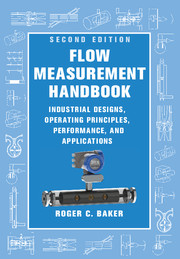Book contents
- Frontmatter
- Dedication
- Contents
- Preface
- Acknowledgements
- Nomenclature
- 1 Introduction
- 2 Fluid Mechanics Essentials
- 3 Specification, Selection and Audit
- 4 Calibration
- 5 Orifice Plate Meters
- 6 Venturi Meter and Standard Nozzles
- 7 Critical Flow Venturi Nozzle
- 8 Other Momentum-Sensing Meters
- 9 Positive Displacement Flowmeters
- 10 Turbine and Related Flowmeters
- 11 Vortex Shedding, Swirl and Fluidic Flowmeters
- 12 Electromagnetic Flowmeters
- 13 Magnetic Resonance Flowmeters
- 14 Ultrasonic Flowmeters
- 15 Acoustic and Sonar Flowmeters
- 16 Mass Flow Measurement Using Multiple Sensors for Single-Phase Flows
- 17 Multiphase Flowmeters 508
- 18 Thermal Flowmeters
- 19 Angular Momentum Devices
- 20 Coriolis Flowmeters
- 21 Probes for Local Velocity Measurement in Liquids and Gases
- 22 Verification and In Situ Methods for Checking Calibration
- 23 Remote Data Access Systems
- 24 Final Considerations
- References
- Main Index
- Flowmeter Index
- Flowmeter Application Index
24 - Final Considerations
Published online by Cambridge University Press: 05 August 2016
- Frontmatter
- Dedication
- Contents
- Preface
- Acknowledgements
- Nomenclature
- 1 Introduction
- 2 Fluid Mechanics Essentials
- 3 Specification, Selection and Audit
- 4 Calibration
- 5 Orifice Plate Meters
- 6 Venturi Meter and Standard Nozzles
- 7 Critical Flow Venturi Nozzle
- 8 Other Momentum-Sensing Meters
- 9 Positive Displacement Flowmeters
- 10 Turbine and Related Flowmeters
- 11 Vortex Shedding, Swirl and Fluidic Flowmeters
- 12 Electromagnetic Flowmeters
- 13 Magnetic Resonance Flowmeters
- 14 Ultrasonic Flowmeters
- 15 Acoustic and Sonar Flowmeters
- 16 Mass Flow Measurement Using Multiple Sensors for Single-Phase Flows
- 17 Multiphase Flowmeters 508
- 18 Thermal Flowmeters
- 19 Angular Momentum Devices
- 20 Coriolis Flowmeters
- 21 Probes for Local Velocity Measurement in Liquids and Gases
- 22 Verification and In Situ Methods for Checking Calibration
- 23 Remote Data Access Systems
- 24 Final Considerations
- References
- Main Index
- Flowmeter Index
- Flowmeter Application Index
Summary
This chapter contains some personal comments on research, manufacturing variation, quality, existing and new flow measurement challenges, micro-engineering devices and new techniques for existing and new flow metering concepts.
I pose the following questions with brief explanation based on my knowledge of the flow measurement industry.
Is there an Opportunity to Develop New Designs in Collaboration with the Science Base?
There is a need and an opportunity for the flow metering industry on one hand, and the science base as it relates to instrumentation on the other, to exploit effective means for technology transfer and to bridge the gap between them, which in the process will raise the profile of the instrumentation sector and ensure that government is aware of its importance. Past experience of encouraging collaboration suggests that industry and the science base do not always appreciate the value of working together. Fundamental and unsolved issues remain in the technology which would benefit from collaboration between industry and the science base. Such collaboration should be mutually beneficial in making the other party aware of important developments.
This gap could also be reduced by facilitating exchanges of people between industry and the science base. Industrial collaboration is an essential part of ensuring that academic engineering and applied science research is focused on the real problems of industry, and the cross-fertilisation will be very likely to generate new ideas.
Over the past 15 years or so, I have found close collaboration with several companies in research and teaching extremely rewarding.
Is Manufacture of High Enough Quality?
The quality of an instrument, and thus its ultimate accuracy, will clearly be affected by the manufacturing process. The manufacturing variation may have predictable consequences for the flowmeter accuracy. Slight variation may require calibration of each instrument. Instruments off the same production process might have different characteristics which may require small adjustments to the product before final calibration. Some changes may cause finished instruments to have different random errors.
The production of instrumentation is a special case in which every finished product may be measured (calibrated) and also the effect of the production process on the final accuracy of the instrument may, in some cases, be predicted and used to specify the production requirements.
- Type
- Chapter
- Information
- Flow Measurement HandbookIndustrial Designs, Operating Principles, Performance, and Applications, pp. 633 - 642Publisher: Cambridge University PressPrint publication year: 2016



